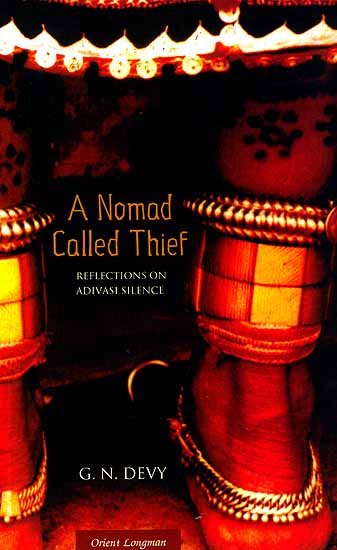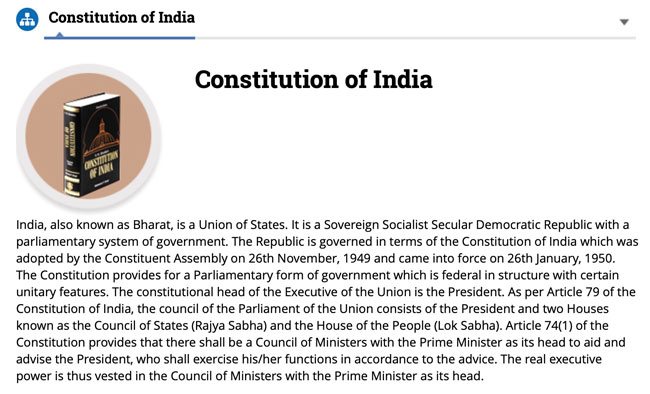
Reflections on Adivasi Silence and Voice by Ganesh [G.N.] Devy | Publications >>
What is the “Criminal Tribes Act” all about?
And what can be done to help the countless victims of stigmatization and deprivation?
To learn more, read or download the full TAG report on Bhasharesearch.org >>
(PDF, 361 pages including the entire text of the final recommendations providing a road-map for the long term development of the Denotified, Nomadic and Semi-nomadic Communities and Tribes, a Bibliography and other historical sources, dated 20 November 2006)
This comprehensive report outlines the steps to be taken in order to alleviate the suffering of countless innocent people, caused by social stigma just as discrimination: disadvantages that render them vulnerable to social exclusion or exploitation on an enormous scale, particularly children and women. It also provides educators, students, researchers, officials, journalists and community workers with valuable insights.
Media persons/students of journalism may also consider reading “Proper coverage of “deprivation”: Ethical considerations for students of Indian journalism“.
Report and Recommendations of the Technical Advisory Group
The process of Notification of innocent communities [like] traders, itinerant entertainers, peasants and disbanded soldiers, begun in 1871 through enactment of the Criminal Tribes Act, should have come to an end soon after Independence. Instead, a Habitual Offenders Act was slapped on them, and their sufferings continued through the last six decades. This entire episode of turning innocent and defenseless communities into vulnerable and victimized groups has been a chapter of shame in India’s social history. […]pp. 42-51
Historical Background: How the Criminal Tribes Act came into existence
The history of the Denotified communities is a poignant one. Historically speaking, there were political and social reasons for declaring such large number of whole communities criminal, and it needs to be put on record as to how such a process with long-term consequences was put into action. A study of the records of the late nineteenth century shows that due to a set of colonial policies, certain communities lost their livelihood, and this lack of work got linked to the concept of such communities living by crime. (Even in England, lack of “ostensible means of livelihood” made a person qualify as a potential criminal at that time.) In fact, it was officially recognised that the British administration’s economic policies, aimed at raising revenue, had made the itinerant communities economically redundant and anachronistic.
p. 51
13. Socio-economic and Educational needs of Denotified Tribes, Nomadic and Semi-Nomadic Tribes
“The DNT have been the victims of the doctrine of criminality by birth. This concept is abhorrent to the present-day thinking […]”p. 89
“[T]he problems of Scheduled Castes, Scheduled Tribes and Backward Classes are […] part of the central and core problems of the country. These three categories of people constitute about 3/4th of the population of the country and almost the entire physical labour force of the country is drawn from them. It is the failure to tackle their problems so as to remove their disabilities and secure their full potential for national development that lies at the root of the many weaknesses faced by post-Independence India to this day. Therefore, these issues and the remedial measures should be approached as central and core concerns of India.”
p. 8
1.8 Third Meeting of Technical Advisory Group:
The suggestions made by Members of the Technical advisory Group during the meeting held on 12th October 2006 were properly recorded, and, together with other suggestions made in the past by the following Government Bodies and Commissions, they were circulated among the Members for discussion leading to the formulation of the Report and Recommendations of the Technical Advisory Group:
a) The National Commission for Denotified, Nomadic and Semi-nomadic Tribes;
b) The National Human Rights Commission;
c) The Commission for Review of the Working of the Constitution;
d) The Ministry of Social Justice and Empowerment;Reference documents presented during the meeting to the Members of the Technical Advisory Group included the following:
a) The Criminal Tribes Act, 1871
b) The Criminal Tribes Act, 1897
c) The Criminal Tribes Act, 1911
d) The Criminal Tribes Act, 1823
e) The Criminal tribes Act, 1924
f) The Bombay Habitual Offenders Act, 1959
g) The Listing of Communities Notified as ‘Criminal Tribes’ up to 1952
h) The listing of Communities as SC or ST in some states as samples
i) The description of some of the Denotified Tribes in official Anthropological sourcespp. 9-10
The Report and Recommendations are being presented here in two parts:Part One: containing the entire set of suggestions received from Members of TAG, suggestions emerging from various former reports, judgements and responses by the Ministry of Social Justice and Empowerment to petitions, as well as texts of various Criminal Tribes Acts enacted during the colonial times. In addition it contains official documents produced by Government authorities that perpetuate the stigma attached to the Denotified communities and deepen the stereotyping of which these communities have been the unfortunate victim. This Part of the Report also contains the ‘Foreword’ and the entire text of the final recommendations providing a road-map for the long term development of the Denotified, Nomadic and Semi-nomadic Communities and Tribes.
Part Two: containing the ‘Foreword’ and the ‘Recommendations’.
1.12 Members of the Technical Advisory Group would like to place on record their sense of satisfaction in being able to fulfill the obligations placed upon them by the Government of India within the specified time limit. TAG feels happy that the formulations offered as ‘Recommendations’ are unanimously approved by all members of the Group. The process of Notification of innocent communities traders, itinerant entertainers, peasants and disbanded soldiers, begun in 1871 through enactment of the Criminal Tribes Act, should have come to an end soon after Independence. Instead, a Habitual Offenders Act was slapped on them, and their sufferings continued through the last six decades. This entire episode of turning innocent and defenseless communities into vulnerable and victimized groups has been a chapter of shame in India’s social history. During the last twenty years, there has been a strong movement shaping up from the grass-roots, which has sought to restore dignity and human rights to these communities. It is a gratifying thought that the Prime Minister of India took a special interest in the issue and the Government decided to invite the Technical Advisory Group to offer its opinion on the aspirations of the Denotified, Nomadic and Semi-nomadic Tribes and Communities, and the ways in which these aspirations need to reflect in law, the rights-discourse and welfare measures. Members of TAG would like to place on record their deep sense of appreciation for the Government’s measure of initiating official thinking on this long-standing issue.
20 November 2006 New Delhi
Source: RECOMMENDATIONS OF THE TECHNICAL ADVISORY GROUP [TAG], New Delhi, 2006
URL: http://www.bhasharesearch.org/Reports/TAG%20Report.pdf
Date visited: 19 March 2020
[Bold typeface added above for emphasis]

“India, also known as Bharat, is a Union of States. It is a Sovereign Socialist Secular Democratic Republic with a parliamentary system of government.” – Constitution of India
Source: National Portal of India
Learn more about the Indian Constitution and decisions by India’s Supreme Court >>
“In 1871, the British passed the ‘Criminal Tribes Act.’ It notified about 150 tribes around India as criminal, giving the police wide powers to arrest them and monitor their movements. The effect of this law was simple: just being born into one of those 150 tribes made you a criminal.” – Dilip D’Souza in “Vicious cycle” | Read the full article in the Adivasi Special issue (The Hindu) >>
“These groups were formally ‘de-notified’ in 1952 by the Indian government, but event today they continue to carry the stigma of being ‘born criminals’.” – “Justice for the DNTs” (Bhasha Trust)” | Learn more >>
“More than 10 crore [100 million] Indians from 1,400 communities belong to Denotified, Nomadic, Semi-nomadic (SEED) Tribes.” – Abhinay Lakshman in “Denotified, nomadic, semi-nomadic tribes: 402 SEED registrations so far online, none approved yet” (The Hindu, 29 August 2022) | Learn more >>
Up-to-date reports by Indian journalists and commentators
To search Indian periodicals, magazines, web portals and other sources safely, click here. To find an Indian PhD thesis on a particular tribal community, region and related issues, click here >>
Search tips
Combine the name of any particular state, language or region with that of any tribal (Adivasi) community.
Add keywords of special interest (music, poetry, dance just as health, sacred grove and biodiversity); learn about the rights of Scheduled Tribes such as the “Forest Rights Act” (FRA); and the United Nations “Declaration on the Rights of Indigenous Peoples”, “Universal Declaration of Human Rights”, “women’s rights”, or “children’s right to education”.
Ask a question that includes “tribal” or “Adivasi”, for instance: “Adivasi way of life better?” (or “tribal way of life worse?”)
Specify any particular issue or news item (biodiversity, bonded labour and human trafficking, climate change, ecology, economic development, ethnobotany, ethnomedicine, global warming, hunter-gatherers in a particular region or state, prevention of rural poverty, water access).
For official figures include “scheduled tribe ST” along with a union state or region: e.g. “Chhattisgarh ST community”, “Himalayan tribe”, “Scheduled tribe Tamil Nadu census”, “ST Kerala census”, “Particularly Vulnerable Tribal Group Jharkhand”, “PVTG Rajasthan”, “Adivasi ST Kerala”, “Adibasi ST West Bengal” etc.
In case the Google Custom Search window is not displayed here try the following: (1) toggle between “Reader” and regular viewing; (2) in your browser’s Security settings select “Enable JavaScript” | More tips >>
Note: hyperlinks and quotes are meant for fact-checking and information purposes only | Disclaimer >>
“In fact, we still do not know to what extent global supply chains are maintained by slavery and child labor. Because of these and other factors, slavery today is more profitable than ever before, and also more woven into the global economy than ever before.” – Siddharth Kara on the persistence of modern slavery| Learn more >>
Human trafficking is a crime. To report in India, call
– Shakti Vahini +91-11-42244224, +91-9582909025 or
– Childline 1098 (national helpline)
Human Rights Commission (posts) | www.nhrc.nic.in (Government of India) >>
Learn more
Adverse inclusion | “Casteism” and its effect on tribal communities
Biodiversity and development – Jharkhand
Bondage | Bonded labour | Human trafficking | Slavery | Zamindari
Chief Justice of India | Imprisonment & rehabilitation
Childhood | Childrens rights: UNICEF India | Safe search
Colonial policies | Freedom Struggle | Independence
Community facilities | NGO | Organizations
Health and nutrition | Recommendations by the Expert Committee
Hul (Santal rebellion 1855-1856) | Tribal freedom fighters
Human Rights Commission (posts) | www.nhrc.nic.in (Government of India)
Information provided by Indian government agencies and other organizations (FAQ)
Nomadic and Semi-Nomadic Tribes | SEED – Government scheme
Shakti Vahini: Striving for Just, Free and Equitable society
Scheduled Tribe (ST) | Denotified Tribe vs. “criminal tribe“
State wise ST list (Scheduled Tribes)
Video | The Expendable People: Adivasis
Video | Hul Sengel: The Spirit of the Santal Revolution (1855) – Jharkhand
Video | Lessons on Human Trafficking – Freedom United
Women | Safe search | President Droupadi Murmu on women’s empowerment
